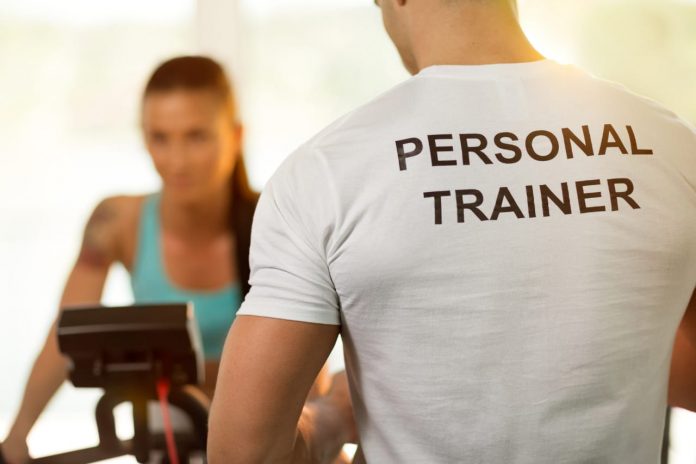Do you run on a mood-elevating body high after crushing a deadlift PR?
Have you admired figures in the fitness industry that have made a difference in their community?
Are you excited about the possibility of helping other people reach their fitness goals in a safe and supportive environment?
If this sounds like you, you might consider becoming a personal trainer. With a variety of career pathing options, you’ll want to understand your own personal strengths and resources before mapping out your plan.
Read on to learn more about your options, and how to execute this very possible dream of yours.
What Does a Personal Trainer Do?
A personal trainer is an expert certified in coaching physical activity. During a client session, a personal trainer can be expected to:
- Provide useful feedback to their client
- Teach them about anatomy and movement
- Offer motivation and encouragement while training.
Typically, a personal trainer will create specific programming that is based on the client’s goals. These goals may include:
- Weight loss
- Athletic performance
- Muscle building for aesthetic purposes
- Strength training
A good personal trainer will work with their client to determine their primary goal.
Roadmap to Becoming a Personal Trainer
How do you eat an elephant? One bite at a time.
How do you become a personal trainer? Take it step-by-step, and know that the path isn’t as winding as you might think. To receive eligible for a nationally-certified degree, you must first:
- Complete high-school equivalent coursework or a diploma
- Complete a Cardiopulmonary resuscitation (CPR) and Automated External Defibrillator (AED) certification program
- Choose a certification program and any specialties
- Prepare for certification exam
- Apply and pass the associated exam
From start to finish, this process can take trainees anywhere from three months to two years to complete. If you are just studying the material and taking the exam, you should expect a 10-12 week investment.
Special Considerations: Exam Contents
When preparing for your personal training exam, you’ll want to consider the components you’ll be studying for. Before choosing your certification type, review the requirements and ask yourself these questions:
- Can the exam be taken online, or are there on-site components or a practical portion?
- How far advanced will you need to schedule your exam?
- How long do you have after purchasing your certification materials before you need to take the exam?
- Can you study all contents at home, or do you have to attend in-person workshops?
- Is there a retake fee?
Most personal training certifications now have online live-proctoring options. Be sure to read the requirements prior to scheduling your exam.
Types of Personal Trainer Certifications
Did you assume that personal training certification is a one-size-fits-all training course? Think again. There are dozens of personal training programs out there that vary in:
- Intensity – how much academic work will you be completing?
- Affordability – how much does the course/exam cost?
- Skill level – do you need prior experience or credits?
- Accreditation – who recognizes the certification?
Review these options to determine the best personal trainer certification for you.
American Council on Exercise (ACE)
The ACE certification is a well-respected program within the health and fitness world. It’s a certification option accredited by the NCCA and prepares you to train special populations– not just the typical gym cliche.
National Academy of Sports Medicine (NASM)
The NASM certification is a highly recognized program built on evidence-based studies into:
- Stabilization
- Endurance
- Strength endurance
- Hypertrophy
- Maximal strength
- Power
This is an NCCA-accredited certification. You can work through a self-guided study or a mentorship option.
American College of Sports Medicine (ACSM)
The ACSM certification is for science-loving candidates. It’s best for those who are curious about the professional aspect of personal training and exercise programming. You can complete a self-directed study online.
National Strength and Conditioning Association (NCSA)
Are you passionate about strength and conditioning? The NCSA certification allows candidates to learn sport-specific programming techniques. It’s a great option for those interested in working with:
- Collegiate athletes
- Powerlifters
- Performance-focused clients
If you are interested in working in a school sports program, this might be the certification for you.
International Sports Sciences Association (ISSA)
The ISSA program hands-down provides the best network of professional support following the completion of the exam. ISSA provides a 6-month job guarantee. You also have access to an online mentorship community.
National Federation of Professional Trainers (NFPT)
Though not as well known, the NFPT certification is a reasonably priced option with a plethora of continuing education resources. You can choose one of two study package options to complete your exam within one year.
National Council on Strength and Fitness (NCSF)
The NCSF foundation is one built on college-level theory and credentialed teachers. There are multiple price points available taught by master’s or doctoral-level NCSF-certified instructors, which makes it a great option for those hoping for an academic experience.
National Exercise & Sports Trainers Association (NESTA)
The NESTA certification is excellent for self-starters as it is a 100% online program. Learn about:
- Exercise physiology
- Kinesiology and anatomy
- Biomechanics
- Nutrition
- Client assessments
- Exercise programming
- Injuries and safety
- Psychology and behavior
- Professional responsibilities
The NESTA certification is valid for four years as opposed to the standard two-year period for most training certifications.
Niche Training
Once you have completed your general personal training certification with an accredited institution, you may decide to pursue additional certifications. Choosing a specialty niche may help draw additional clients who are interested in expert-level coaching.
Group Fitness Instructor Certification
Do you love Zumba or group HIIT classes? A group fitness instructor certification allows you to:
- Provide an inclusive and welcoming space
- Understand how to manage teaching multi-person fitness classes
- Learn how to apply motivation and feedback in a group setting
- Know how to modify a plan for multiple people
Many fitness centers love to see their personal trainers receive this type of certification.
Medical Exercise Specialist Certification
A Medical Exercises Specialist approaches movement as a form of treatment. Working in tandem with a healthcare team or healthcare providers, this specialist certification gives you more tools to work with those suffering from injuries and chronic diseases.
Senior Fitness Specialist Certification
A Senior Fitness Specialist has the skills to work with a population of older adults and keeps their specialized needs in mind while developing programming. Working with older adults can encourage them to focus on:
- Gaining strength
- Combat muscle deterioration
- Reduce the chance for injuries
- Improve mental health
Because aging adults sometimes need special modifications, this type of certification can make training safer for this special population.
Crossfit Coaching
Are you passionate about the Crossfit craze? You must be certified in Crossfit methodology in order to safely coach on an individual or group basis. You might complete a Crossfit Level 1 course, or continue on to achieve higher levels of recognition.
Powerlifting and weightlifting federations offer similar certification programs. Research your favorite type of strength programming to learn more about various offerings.
Pre/Post-Natal Coaching
Keep your clients safe at every stage in their pregnancy. Gain certification in coaching specific to the physiological and psychological aspects of working with pre-and-postnatal women.
If you are passionate about coaching women in safely exercising through every trimester, or how to jump back into movement postpartum, this is a great continuing education option for you.
Stretching & Flexibility Certification
Stretching is a necessary part of any programming cycle. It will help your clients avoid injury while maintaining performance-enhancing mobility. If you’re interested in becoming a stretching and flexibility expert, a stretching course may be a great enhancement option for you.
A stretching and flexibility certification allows trainers to develop a better understanding of:
- The physiology of stretching
- Flexibility and flexibility enhancement
- Mobility training and how it can benefit other workouts
Once certified in stretching and flexibility, you will feel more confident stretching your clients without the risk of injury. You might also instruct them in proper warmup or cooldown techniques.
Nutrition Coaching
At some point, your clients are going to approach you with their nutrition-related questions. Don’t let yourself go unprepared for this opportunity to dramatically enhance your client’s health.
Nutrition is a fundamental component of physical fitness. It will need to be considered during physical training in order to see the results your clients expect.
Make a Difference in the Health and Fitness Community
For so many, the gym is a safe space to learn, grow, and fail in a supportive environment. To those that need a little extra help, a successful personal trainer can make all the difference in their journey. Becoming a personal trainer might be the best way for you to give back to the community while also earning an income doing something that you love.
For more joy-generating wellness and career pathing tips, check out more content on the lifestyle section of the blog.









